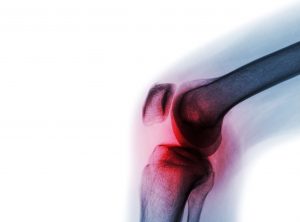Avascular Necrosis of the Knee
What is Avascular Necrosis?
 Avascular necrosis (AVN), also called osteonecrosis, aseptic necrosis, or ischemic bone necrosis, is a condition that occurs when there is loss of blood to the bone. Because bone is living tissue that requires blood, an interruption to the blood supply causes bone to die. If not stopped, this process eventually causes the bone to collapse.
Avascular necrosis (AVN), also called osteonecrosis, aseptic necrosis, or ischemic bone necrosis, is a condition that occurs when there is loss of blood to the bone. Because bone is living tissue that requires blood, an interruption to the blood supply causes bone to die. If not stopped, this process eventually causes the bone to collapse.
Symptoms of Avascular Necrosis
In its early stages, AVN typically cause no symptoms; however, as the disease progresses it becomes painful. At first you may experience pain when you put pressure on the affected bone. Then, pain may become more constant. If the disease progresses and the bone and surrounding joint collapse, you may experience severe pain that interferes with your ability to use your joint. The time between the first symptoms and collapse of the bone may range from several months to more than a year.
Treatment of Avascular Necrosis in the knee
Conservative treatments of avascular necrosis in the knee are multi-modal. NSAIDs can be used for the pain, medicines to reduce further damage can be used, physical therapy may be offered, and you may be asked to rest the knee.
If the knee has not been treated quickly enough, or resistant to treatment, than surgical intervention for the avascular necrosis may need to be utilized by your orthopedic surgeon. Depending on where the damage is as well as the extent of the damage there are a couple choices to go over with your surgeon.
- Core decompression – the surgeon will remove some of the inside of the bones so that blood can penetrate more deeply. The goal of this approach is to deliver more oxygen to the tissues that are being starved.
- Osteotomy – a piece of bone can be removed to reduce the pressure being put on the area that is struggling.
- Bone graft – a piece of bone can be added to replace the dead tissue so that they joint can function properly.
- Total knee replacement – if the joint is too far gone and damage is causing too much pain the surgeon may consider replacing the joint entirely as a last resort. Knee replacement can be the entire joint, or half of the joint can be replaced.
Knee pain? Call 817-375-5200 to schedule an appointment with an AOA Orthopedic Specialist today!


